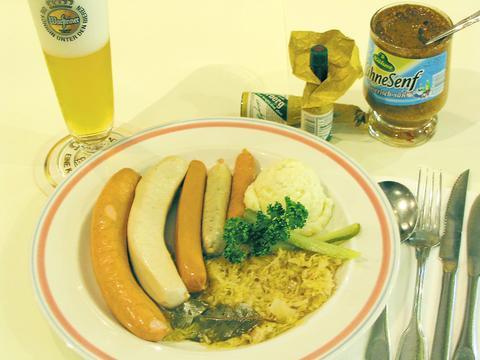Opened seven years ago, Taipei's German eatery, Haxen Gastatte has built up a solid reputation with its south German menu, which has brought in a regular clientele of office and business people.
Designed along the lines of a European eatery, with solid dark wooden furniture and an interior which is sparsely decorated, Haxen Gastatte provides a relaxing no-fuss atmosphere in which to wine and dine.
While not exactly extensive, the menu does feature enough Germanic fare to pacify the hungriest sausage, pork knuckle, potato and sauerkraut enthusiast. As you'd expect, and pretty much in keeping with tradition, the eatery's most popular dish is pork knuckle. Available either boiled or roasted, the pork knuckle served up at Haxen Gastatte is both a hearty dish and, when compared to other German diners, quite moderately priced; at just NT$510 for both the roasted and boiled varieties.

PHOTO: GAVIN PHIPPS, TAIPEI TIMES
For the all-day breakfast buff, the NT$180 farmer's breakfast, a plate of fried potato topped off with two fried eggs should set them for the long-day ahead.
Haxen Gastatte offers patrons a total of eight types of German sausage. All priced at NT$280, the sausage inventory lists veal, cabanossi, cervelet, pork, pepper, frankfurter, chipolate and Nurnberger. For the true Haxen Gastatte sausage sensation, patrons should try the NT$420 mixed plate -- four types of sausage of the diners' choice with sauerkraut and mashed potato.
Although predominantly based around southern German meat-heavy dishes, there are a couple of vegetarian dishes on the menu. The most popular is the pesto spatzle, or pesto dumplings, costing NT$260. Along with the a la carte menu, the restaurant also has daily specials. Both the lunch and all-day specials change everyday and are reasonably priced from NT$199 through NT$550 depending on what ingredients the chef has opted to use.
Diners can choose from two brands of German beer -- Erdinger or Warsteiner. While there's only two brands, there are more than two varieties on offer. There are regular Pilsners, dark and yeast beers, which cost between NT$145 to NT$195. For diners looking for something a little less gassy, then they should try the reasonably priced schnapps, with glasses of Kirsch Wasser and Poipek Williams at NT$180. Along with the schnapps, the restaurant also serves a rather interesting drop called Underberg, which, according to manager, Kero Chen (

June 23 to June 29 After capturing the walled city of Hsinchu on June 22, 1895, the Japanese hoped to quickly push south and seize control of Taiwan’s entire west coast — but their advance was stalled for more than a month. Not only did local Hakka fighters continue to cause them headaches, resistance forces even attempted to retake the city three times. “We had planned to occupy Anping (Tainan) and Takao (Kaohsiung) as soon as possible, but ever since we took Hsinchu, nearby bandits proclaiming to be ‘righteous people’ (義民) have been destroying train tracks and electrical cables, and gathering in villages

Dr. Y. Tony Yang, Associate Dean of Health Policy and Population Science at George Washington University, argued last week in a piece for the Taipei Times about former president Ma Ying-jeou (馬英九) leading a student delegation to the People’s Republic of China (PRC) that, “The real question is not whether Ma’s visit helps or hurts Taiwan — it is why Taiwan lacks a sophisticated, multi-track approach to one of the most complex geopolitical relationships in the world” (“Ma’s Visit, DPP’s Blind Spot,” June 18, page 8). Yang contends that the Democratic Progressive Party (DPP) has a blind spot: “By treating any

This year will go down in the history books. Taiwan faces enormous turmoil and uncertainty in the coming months. Which political parties are in a good position to handle big changes? All of the main parties are beset with challenges. Taking stock, this column examined the Taiwan People’s Party (TPP) (“Huang Kuo-chang’s choking the life out of the TPP,” May 28, page 12), the Democratic Progressive Party (DPP) (“Challenges amid choppy waters for the DPP,” June 14, page 12) and the Chinese Nationalist Party (KMT) (“KMT struggles to seize opportunities as ‘interesting times’ loom,” June 20, page 11). Times like these can

Swooping low over the banks of a Nile River tributary, an aid flight run by retired American military officers released a stream of food-stuffed sacks over a town emptied by fighting in South Sudan, a country wracked by conflict. Last week’s air drop was the latest in a controversial development — private contracting firms led by former US intelligence officers and military veterans delivering aid to some of the world’s deadliest conflict zones, in operations organized with governments that are combatants in the conflicts. The moves are roiling the global aid community, which warns of a more militarized, politicized and profit-seeking trend